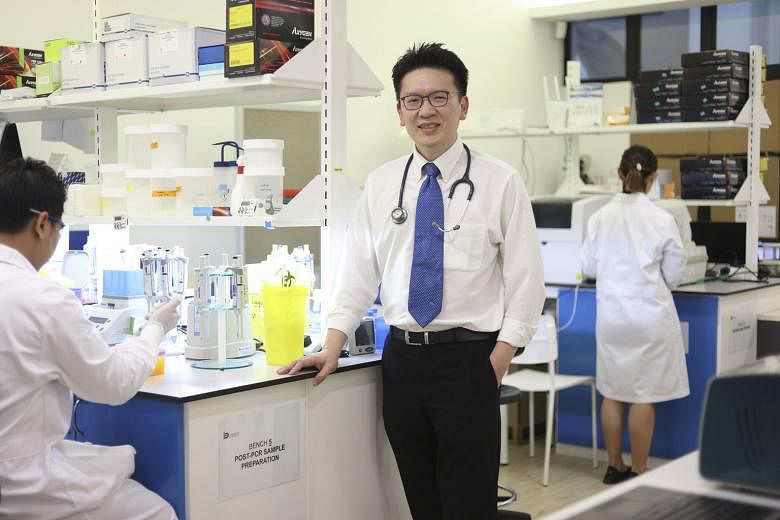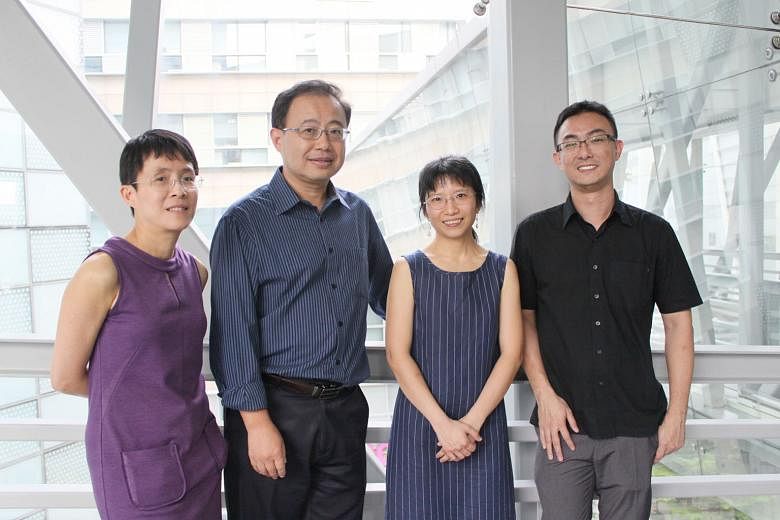One of the fastest-growing fields in cancer detection is the development of liquid biopsies, which detect the presence or type of cancer via DNA fragments from tumours in the blood of patients, without the need for invasive tissue sampling.
Seen as a revolution in cancer care, they could significantly shorten diagnosis time, find very early-stage cancer in those with no symptoms and provide follow-up checks on the success of treatments.
Singapore is making its mark in the field and has developed such tests for a range of tumours.
Cancers which locally based researchers and industry players are tackling include breast cancer and nasopharyngeal cancer (the nasopharynx is located behind the nose and above the back of the throat).
A team here recently pioneered a simple blood test that can detect a biomarker - a molecule that indicates certain processes taking place in the body - that is found in up to 70 per cent of all breast cancer patients who suffer a relapse.
The team also discovered that early-stage breast cancer patients who have this biomarker, called 1Q21.3, are almost 40 times more likely to relapse within five years, compared with those who do not.
In Singapore, between 2011 and 2015, breast cancer was the top killer for women who had cancer. It accounts for one in three cancers in women, according to the latest cancer registry report released in May.
With the blood test, doctors could potentially do away with conventional tumour biopsies, in which a piece of, or fluid within, the tumour is extracted by a needle or by surgery. Instead, they simply need a tiny sample of blood.
With the new test, which needs to begin clinical testing, there will be potentially a cheaper, faster way to detect breast cancer relapses much earlier than with conventional tests such as computerised tomography (CT) scans.
Research on the biomarker was led by the Genome Institute of Singapore (GIS) - which comes under the Agency for Science, Technology and Research - Tan Tock Seng Hospital (TTSH) and the National University Health System (NUHS), with international collaborators from Denmark and the United States.
There are many advantages to this biopsy, said Professor Yu Qiang, senior group leader of GIS' cancer therapeutics and stratified oncology group. For one thing, it can predict the risk of a breast cancer relapse when a patient first comes for treatment, which would have been impossible before.
It can also be harnessed to monitor how the cancer responds to treatment and can later on detect whether or not there is a relapse.
The crucial difference, compared with current technologies such as CT scans, explained Prof Yu, is that a liquid biopsy can spot traces of the cancer relapsing earlier.
With CT scans, "by the time you see the tumour again, millions of cancer cells would have accumulated already in the body", he said.
In contrast, a liquid biopsy can be done when there are just thousands of cancer cells in the blood, even before a tumour has formed.
The liquid biopsy also saves time and blood. It requires only 1ml of blood, compared with the 20ml needed for other tests, such as next generation sequencing-based (NGS-based) blood tests, which is another type of liquid biopsy.
Results can be obtained in 24 hours, compared with two weeks for NGS-based blood tests, one week for tissue biopsies and three days for CT scans, Prof Yu added.
He said the earliest that patients could start using his biopsy is in two to three years, if clinical trials are successful.
He acknowledges that while a liquid biopsy can accurately predict the risk of relapse for 70 per cent of breast cancer relapse patients, this leaves 30 per cent of patients unaccounted for. So the next goal for his team is to find a biomarker that is present in all breast cancer relapse patients.
Meanwhile, another local firm has also made rapid progress on an Asia-centric cancer: nasopharyngeal cancer. Local firm Lucence Diagnostics has pioneered a way to easily detect this cancer by examining a patient's blood.
Through zooming in on a DNA fragment of the cancer-causing Epstein-Barr virus called BamHI-W, the liquid biopsy is 97 per cent accurate in telling if a patient has nasopharyngeal cancer or not.
Lucence Diagnostics founder and chief executive Tan Min-Han said he is working with all major cancer practices in the country on this liquid biopsy and that it is now commercially available.
While it is relatively rare in other parts of the world, nasopharyngeal cancer is more frequently seen among men of Chinese ethnicity.
Much like the liquid biopsy for breast cancer relapse, Dr Tan's test is fast, non-invasive and affordable. His firm is being recognised nationally, winning $100,000 as a runner-up at Spring Singapore's start-up competition Slingshot@ Switch last month.
Speaking about the future of liquid biopsies, Dr Tan said: "Cancer is the leading cause of death in the developed world. Liquid biopsies represent a truly next-generation platform that will allow us to detect many cancers at an early stage. If that can be achieved, cancer can be treated, and cancer can be radically reduced as a cause of death."
Medical oncologist Tan Wu Meng, a Jurong GRC MP, said: "These tests are very promising. They're easier to perform and less uncomfortable for the patient than traditional solid biopsies. The key step is to validate liquid biopsy against existing standards of care."
The global market for such tests is set to grow at a compound annual growth rate of 23.4 per cent from now to 2022, swelling to US$2.05 billion (S$2.8 billion), according to research firm MarketsandMarkets.



